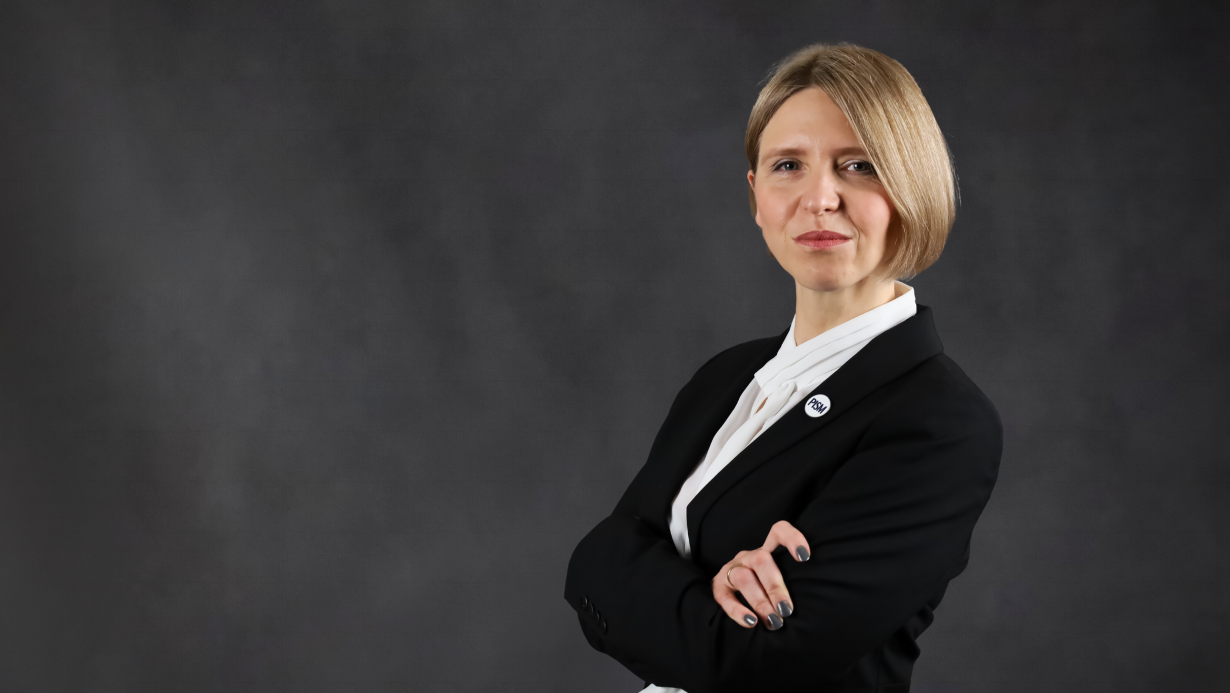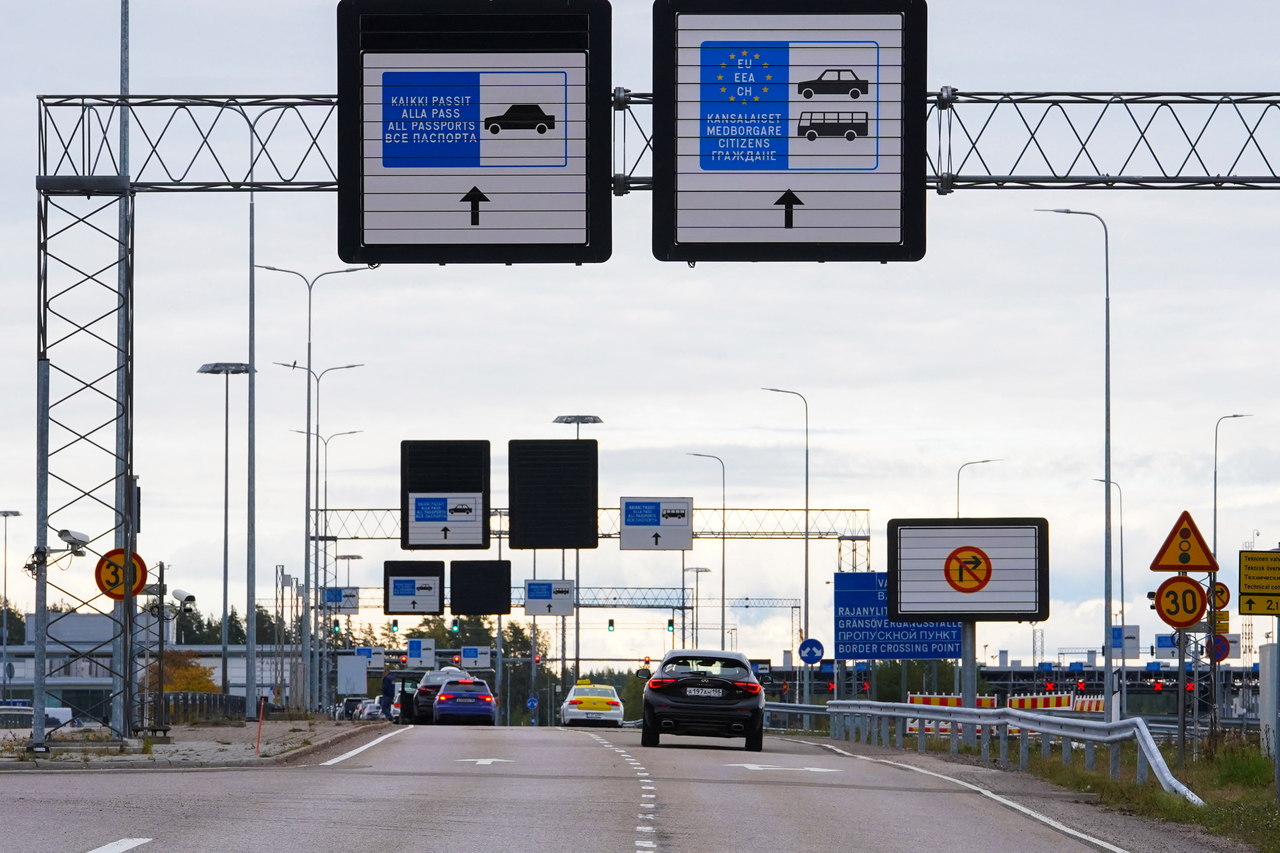Russians Against the War: Under the White-Blue-White Flag
Russians opposing the war in Ukraine use the white-blue-white flag (WBW) to identify themselves. It is used by a variety of circles, from democratic to radical, including groups admitting to guerrilla warfare in Russia and Russians fighting in Ukraine against Russian troops. Protesters against the invasion of Ukraine are a minority in Russian society. They can openly voice their views only outside the Russian Federation, so their actions do not translate into a change in Russian policy.
.jpg) RADOVAN STOKLASA/ Reuters/ FORUM
RADOVAN STOKLASA/ Reuters/ FORUM
Symbolism of the WBW Flag
In late February this year, Kai Katonina, a Berlin-based artist of Russian descent, posted on social media a Russian flag from which she had removed the colour red to symbolise the blood of Ukrainians in protest against the war. Since March, this flag has been used at protests in and outside Russia to demonstrate opposition to the war in Ukraine. According to some Russians, the WBW refers to the democratic traditions of the Novgorod Republic, while according to others it resembles the white-red-white flag that was present during the 2020 anti-government protests by Belarusians.
The new symbol was met with criticism from the Russian authorities. On 31 March, the Chairman of the Russian State Duma Committee on Security and Anti-Corruption Vasily Piskarov called for banning the WBW flag as extremist. He warned against outside interference for a “Western Maidan”. At the same time, the Russian authorities succeeded in suppressing the initial resistance of some citizens, including through repression and a ban on referring to Russia’s actions in Ukraine as a “war”. The Russian authorities do not appear to fear strong public resistance in the country. According to a survey by the Levada Center, 44% of Russians are in favour of continuing the so-called “special military operation” in Ukraine (data as of 29 September 2022). Open public opposition of Russians to the war became possible only outside the Russian Federation. Initially, they demonstrated their opposition by joining Ukrainian anti-war demonstrations. Over time, these Russians organised demonstrations on their own (the largest of them took place in May in Prague, attended by about 5,000 people).
Anti-War Committees Vs. the Opposition
Russia’s invasion of Ukraine catalysed grassroots action by some Russian activists living in the EU who realized that their situation could worsen under the influence of Vladimir Putin’s policies. They began organising demonstrations, writing petitions against the war, advocating tighter sanctions on the elites and oligarchs in Russia, but opposing sanctions targeting “ordinary citizens”. The previously fragmented Russian opposition then became more active. Mikhail Khodorkovsky, Lyubov Sobol, Garry Kasparov and several other prominent opposition figures established the Anti-War Committee, which aimed to break the conviction among Western audiences that all Russians support the war against Ukraine. They organised the “Free Russia Congress” in Vilnius on 31 August to 2 September. They pointed out that military action in Ukraine could contribute to the fall of the Putin regime. The role of the opposition has been to work together to support the invaded Ukraine, as well as to help Russians who live in the EU. They point out that Putin is responsible for causing the war and they stand for a Russia that is democratic and respects the territorial integrity of its neighbours. When Putin announced partial mobilisation on 21 September, the Russian opposition joined the campaign for EU countries to accept Russians fleeing the military call-up as refugees.
Due to the distrust among civil society organisations of opposition politicians, a competing event was organised by another Prague-based Anti-War Committee in July. As part of the First Congress of Russian Civil Societies in Europe, 20 NGOs summed up their activities on behalf of Ukrainians. The war prompted them to cooperate, as they were concerned that impediments to enter the EU, education for the Russian diaspora, and restrictions on independent Russian journalists and activists, among others, would arise in European countries. In August, the EU Member States indeed discussed the issue of restrictions on the rights of Russians to tourist visas, which prompted representatives of the Russian diaspora to circulate petitions to the authorities of these countries arguing against the introduction of such restrictions. In the end, the EU Council did not decide to stop issuing tourist visas to Russians.
Russian Volunteers on the Ukrainian Frontlines
Since March, the International Legion for the Territorial Defence of Ukraine has been operating under the flag of the WBW Legion “Freedom of Russia”. The exact number of Russian volunteers is not known (according to estimates by the Ukrainian side, there are 4,000 of them and 3,000 more are awaiting registration). They joined the action against the partial mobilisation and called on Russian soldiers to surrender to the Ukrainian side and/or to join the Legion’s structures. In order to increase the chances of the fall of the Putin regime, on 31 August the Legion signed a cooperation agreement with the National Republican Army (NRA), allegedly operating on Russian territory. The formation admits to acts of arson against military commissions. On 20 August, the NRA admitted to the assassination of Daria Dugina, the daughter of Alexander Dugin, a Russian philosopher and geopolitician with ties to Russia's power elite (there is no confirmed information about the NRA’s previous actions or the credibility of the Dugina assassination claims).
The case of Daria Dugina’s assassination was used by former Russian MP Ilya Ponomaryov to present his anti-government political agenda. He was arrested in Russia in absentia for disparaging the Russian military. He wants to create a political centre of military resistance to the Putin regime by calling for radical methods of fighting the Russian authorities. He appeared with his manifesto against the background of a WBW flag, which stirred up a lot of controversy among the Russian diaspora. The Anti-War Committee excluded him from the Vilnius conference, stressing its categorical opposition to the call for terrorist attacks on Russian territory. Ponomaryov currently lives in Kyiv and is agitating for the breakup of the Russian Federation. He argues that Putin cannot be removed from power peacefully. On 4 October, he spoke at the European Parliament where he argued for the need to build an anti-Putin coalition in the West.
Conclusions
Russians who actively and openly oppose the war in Ukraine are still a minority within their own society. They face repression or social ostracism at home for doing so, while defectors outside the Russian Federation can associate. Anti-war and opposition committees of Russians are still not gaining recognition and clear support among the Russian diaspora living in the EU. Their demonstrations under the WBW flag are not comparable to pro-Putin protests, nor do they receive adequate media coverage.
The purpose of the Russian diaspora’s organising in the face of the war in Ukraine is an attempt to manifest resentment against Putin’s actions, but also the fear of a worsening situation for Russians living abroad. The need for Russians to self-organise and cooperate also stems from the perpetuating image of Russians as aggressors, which they want to counter.
Anti-war committees and initiatives help those who flee the country or actively oppose the Putin regime; however, they are scattered and often duplicate their efforts. The role of the anti-war committees may prove important in engaging the new wave of Russians fleeing mobilisation, although it is uncertain how many Russians among them will manifest anti-regime sentiments. Anti-war committees, meanwhile, may be effective in organising Russian émigrés and building Russian civil society abroad.
Poland can continue to support Russians who speak out against the war and Putin’s system by granting humanitarian visas to activists who carry out anti-regime activities and independent journalists. The symbolism of the WBW flag has become an important marker for Russians abroad to manifest their stance against the war, but some of the circles that also use it (such as NAR) commit or aim to commit violent acts. It is possible that Russian services will want to discredit the opposition and may provoke, for example, acts of vandalism (or a terrorist act) within the EU using the WBW symbol.




